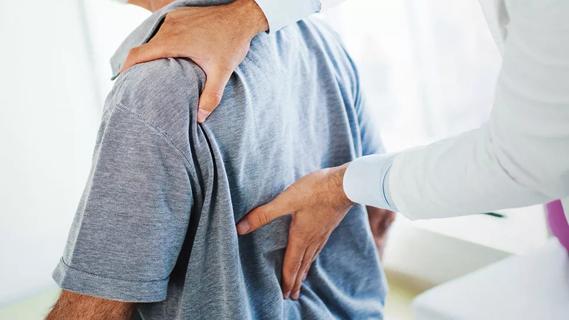Get moving, use cold packs, and try yoga and stretches to ease back pain

Back pain has an amazing ability to stop you in your tracks. And most of us know the feeling. Studies show that around 80% of people get hit with low back pain at least once in their lives.
Advertisement
Cleveland Clinic is a non-profit academic medical center. Advertising on our site helps support our mission. We do not endorse non-Cleveland Clinic products or services. Policy
The good news? Most episodes of back pain will improve within days or weeks and not turn into a chronic issue.
But you don’t have to take back pain lying down. (In fact, you shouldn’t.) Pain management expert Tara-Lin Hollins, MD, discusses home remedies you can try to soothe this common ailment.
Most of the time, you can care for lower back pain at home. Try these tips to help your back — no medication or procedures required.
When you wake up with an aching back, it may be tempting to just lay in bed all day. But staying still for too long won’t do much good. Engaging in some light exercise or even something like a brisk walk can be helpful, though.
“Avoiding exercise can make back pain worse,” Dr. Hollins warns. “Try to keep moving and walking around as usual. Movement relieves pain and strengthens your muscles, helping you prevent a future episode of pain.”
But it’s all about taking baby steps. If your back pain happened due to a certain exercise-induced injury, stay away from that specific activity until the pain is gone. Once your back feels better, you can ease back into lifting or strenuous exercise, but do it gradually. If you do too much too quickly, you could end up sidelined with back pain all over again.
Advertisement
If your pain has just started, consider applying cold packs. The cooling can help decrease swelling and inflammation, Dr. Hollins explains. Cold packs can also provide relief by numbing some of the painful nerves.
If swelling or inflammation is subsiding but you’re still in pain, consider that some people find a heating pad or a hot bath to be the best thing for back pain, and there’s some evidence from a 2017 study that supports this. Keep in mind if you try the heat route: Moist heat, like in a hot shower or bath or with a moist heat pack, may work better than dry heat.
“While heating up an area can help get your back more limber, use heating pads carefully, as they can get too hot and burn the skin,” Dr. Hollins cautions. “Don’t use them on children or older adults, or while sleeping.”
You don’t have to be a yoga expert or even attend class regularly to reap some serious benefits from yoga. This ancient practice can loosen your back, bringing you some quick relief.
You can do most yoga poses without any special equipment. A yoga mat is helpful but not necessary. You can also just spread some towels on the floor for cushioning.
For starters, try child’s pose:
Try and find a simple yoga routine that you can follow along through a video or a class. The movement between poses will not only keep you from staying still for too long, but also can help soothe your back pain. As with any exercise, stop if it hurts. And if you have any health conditions, talk to your doctor before starting a new exercise program.
You don’t have to do a full yoga routine to find back relief either. If this is too much at first, try with individual stretches that you can sneak into your morning routine or even during lunch breaks.
For example, an easy, low-intensity stretching exercise is the Superman pose, which can help make your muscles feel more stabilized and help strengthen your upper back and hips.
There are even specific stretches that focus on different parts of the back, for example, stretches like cat-cow and bridge pose can focus more on lower back pain. If you feel like your back pain’s source is from sitting at a desk all day, there are stretches like neck rolls and shoulder blade circles that you can do while seated.
Stress can cause you to unconsciously tense your muscles, including the ones in your back, shoulders and neck. We can’t always avoid stress, but we can lower the stress response in our bodies.
Advertisement
Dealing with stress in healthy ways can relax your muscles and turn down the dial on stress-induced back pain. Not sure where to start? Try one of these techniques:
Are you hunching over to reach your keyboard? Or do you squint and lean forward to read your computer screen?
“Slouching at our desks is a common trigger of back pain,” says Dr. Hollins. “When you’re sitting all day, it’s important to have proper ergonomics and take breaks to move around, even if only for a few minutes.”
Try these tips to prevent back pain from your workspace:
Advertisement
Most of the time, minor back pain responds well to home remedies and lifestyle changes. But sometimes, back pain is a sign of another medical condition. Seek medical care if your back pain:
But what kind of doctor should you see for back pain? “Start with your primary care provider, who can rule out conditions that may be causing the pain,” Dr. Hollins advises. “A pain management or spine specialist is an option for people who have severe or ongoing pain. A specialist can often work toward identifying the source of your pain and provide targeted treatment options.”
Another option is to ask your healthcare provider about seeing a spine-certified physical therapist. These therapists specialize in back pain and guide you through exercises to help relieve your specific issue.
Back pain is your body’s way of telling you something’s wrong. If the pain doesn’t get better with home remedies, don’t ignore it — contact a healthcare provider for help.
Advertisement
Learn more about our editorial process.
Advertisement

Hanging upside down for any length of time may decompress the tension in your spine

Drinking alcohol can cause nerve pain, dehydration and weight gain, which can all lead to back pain

Your sleep position, immobility, mattress and underlying conditions can all cause morning back pain

Rest may be all you need to get rid of running-related lower back pain

It’s always a good idea to let a healthcare provider know about any back pain you’re experiencing, especially if it results from trauma or persists longer than three months

From physical and biofeedback therapy to nerve ablations and blocks, there are many nonsurgical options for managing back pain

Rest, physical therapy, acupuncture and nerve blocks are just a few ways to find relief

Back spasms, shingles and disk conditions can all feel like a burning sensation

Wearing a scarf, adjusting your outdoor activities and following your asthma treatment plan can help limit breathing problems

Your diet in the weeks, days and hours ahead of your race can power you to the finish line

When someone guilt trips you, they’re using emotionally manipulative behavior to try to get you to act a certain way